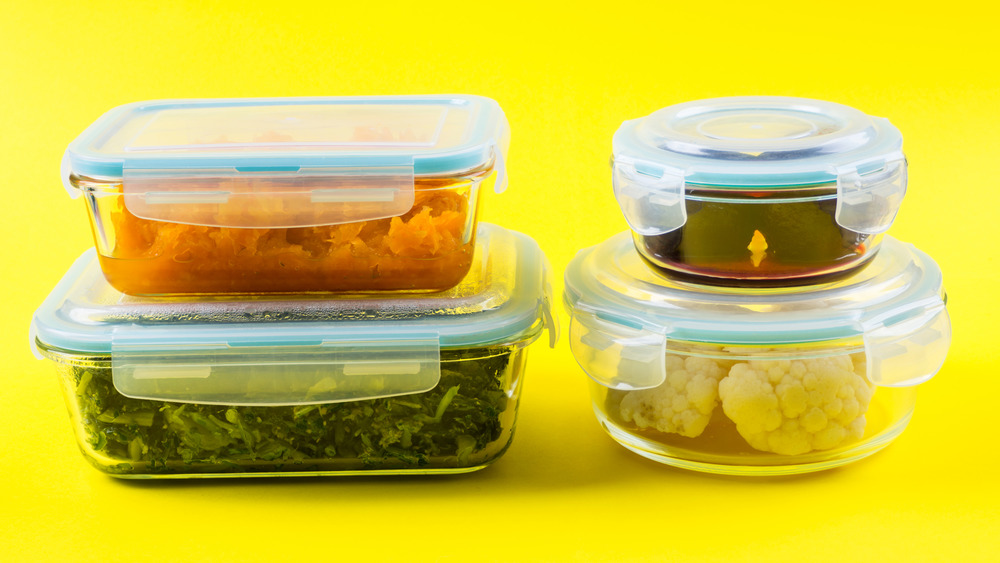How To Tell If Your Egg Salad Has Gone Bad
If you've ever cooked an egg, you know how easy it is to prepare one — whether it's hardboiled, scrambled, over hard, or via some other method of cooking, eggs are a convenient and healthy way to pack in some protein. The downside to that is eggs don't have much of a grace period when it comes to freshness — and if they're eaten after they've gone rancid, that might not end well.
That said, welcome to Egg Salad 101, where we'll be learning all about how long it's safe to eat, how to properly store it, what causes egg salad to go bad in the first place, and the signs to look out for to know if it has officially gone rancid. Before you say it, we know what you're thinking: Obviously, if your egg salad smells terrible, it's no good, right? The short answer: yes and no. But there are some pretty important things you should know before deciding to snack on that odorless five-day-old salad.
What causes egg salad to go bad?
First, let's talk about what causes egg salad to go bad in the first place — and, full disclaimer: this is sort of gross. Naturally, the ingredients in egg salad vary, depending on how you make it; for the sake of simplicity, let's stick with a classic egg salad recipe, which has hard-boiled eggs, mayo, mustard, salt, and pepper. Right off the bat, we know that the eggs and milk-based mayo are the most prone to developing bacteria that can lead to spoiling. According to Livin Paleo Cuisine, "These growths can include pathogenic bacteria, such as salmonella, which can grow in a temperature between 40 degrees and 140 degrees Fahrenheit and which can cause foodborne illnesses. They also include spoilage bacteria, such as Listeria monocytogenes."
So when does all of that start to happen? If the salad is stored properly (more on that later) and made with fresh ingredients, it should be safe to eat for up to a maximum of five days. Pro tip: Adding lemon juice or vinegar helps to keep it fresh. If you really want to err on the safe side, egg salad is best if eaten within three days of making it; that way, you still get to enjoy all of its flavors and nutritional benefits without any of the is-this-still-okay-to-eat anxiety.
Signs that your egg salad has gone bad
Let's be honest: Rancid eggs smell terrible, and once they've gone bad, the odor doesn't get any better from there. As the bacteria develops, the salad will continue to take on a sour, sulfur-like smell, and discoloration and mold will likely occur — but those are the obvious signs, which you probably already knew. What you might not have known: Even if your egg salad doesn't give off any foul odors or have visible signs of spoilage, it might still be unsafe to eat. Per Livin Paleo Cusine, "Certain forms of food-borne bacteria, particularly those that can develop on refrigerated foods over time, leave little or no evidence of their presence. If the egg salad is older than five days, you should assume that bacteria has begun to form and that it should be discarded, even if you do not smell or see anything."
Another telltale sign your salad has gone bad and you've already eaten it: if you start to experience diarrhea, vomiting, fever, nausea, fatigue, and/or abdominal cramps between 30 minutes and 48 hours afterward. Symptoms of food poisoning usually last between four to eight hours. If they last longer than that, you should consider seeking medical assistance.
How to properly store egg salad
Properly storing your egg salad is the key to maintaining its freshness and edibility. If egg salad is left at room temperature for just two hours, it'll likely develop bacteria and no longer be safe to eat, says Livin Paleo Cuisine. The United States Department of Agriculture suggests refrigerating egg salad in a sealed, airtight container immediately after making it, at a temperature between 36- and 40-degrees Fahrenheit. (If the salad isn't sealed, it'll spoil within a day or two, even if it's in your refrigerator.) That said, storing egg salad at any temperature outside of that threshold can attract dangerous bacteria, which means freezing it is risky, too.
The egg salad should also not be in a container with any other food. If you can't separate it from other foods — for instance, if it's in a sandwich — extra precautions should be taken, such as wrapping the entire sandwich in foil before sealing it in another airtight container in the refrigerator. Since it's so easy for bacteria to latch onto the components in egg salads, it's also safest if you avoid eating it directly out of the container in which you stored it. That way, you can avoid bacteria transferring from your mouth to the salad via the utensil you're using.



